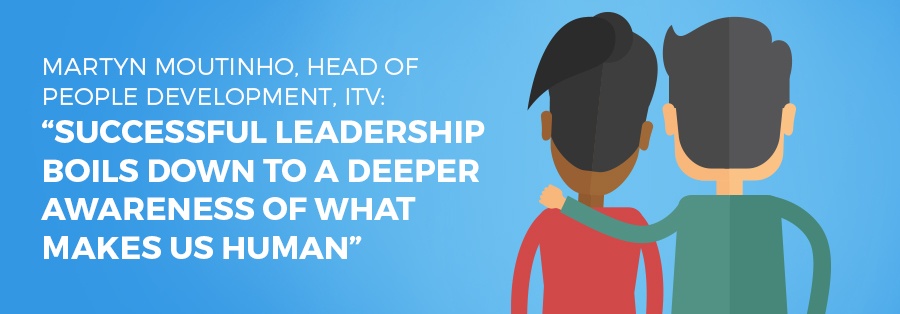
Martyn Moutinho, head of people development at ITV, explains why being a connected leader in the modern workplace is more important than ever before.
In a world of being busy and doing lots, I think successful leadership boils down to a deeper awareness of what makes us human and then making conscious choices with that information as opposed to just running on autopilot.
The criteria of a successful leader has changed because the requirements of the jobs that we need people to do now, compared with two decades ago, is different. In this environment we need leaders who can create a culture which fosters creativity and ensure people feel both safe to take risks and equally challenged – in a positive and growing way, so they aren’t bored.
But while the criteria of a successful leader may have changed, the principles behind mutually beneficial human relationships have not.
Have their back
We know what it feels like to have a great relationship with someone, whether it’s inside or outside of the workplace. The principles of human connection do not change just because you walk through some doors at 9am. In a world that's posing new challenges that've we've not faced before, employees need to trust that, as their leader, you've got their back and that you genuinely respect their ideas.
Businesses spend a lot of time and money gathering and analysing 'big data' but what about the even bigger data about ourselves? The great news is there is some incredible biofeedback technology that’s now accessible. It provides an insight to all sorts of useful information about what's going on inside our bodies.
Data is useful but it's what you do with that information that makes the difference. 20 years ago, that technology just didn’t exist. Not to mention the scientific evidence that explains the effect that practising mindfulness has on our behaviours and the physical structures of our brains which, in turn, affect our decision-making and general wellbeing.
Strike the leadership balance
I'm sure most will agree there isn't a shortage of leadership models and I genuinely feel they can all help us in a variety of ways.
Firstly, you need to have a healthy level of curiously not just about others but also about yourself. Spend quality time, maybe a little more than you do now, to listen to what you are saying to yourself and just as importantly, to others.
Observe your behaviours (and theirs!) and then consciously make choices to try different approaches. If it doesn't quite work out, that's ok – learn from it and move on. That's in our very human nature and it'll only encourage your team to do the same.
Like most things in life there's a balance to strike – I'm a believer that too much of one thing isn't always good for you. For example, leaders shouldn’t be seen to try so hard that they appear not genuine, but equally they mustn’t be so unconscious that they are blissfully unaware of what their data and others are telling them.
Conscious Vs unconscious leadership
Really great leaders have a deep understanding of themselves as individuals and they use that to guide their leadership. That means the behaviours of a successful leader can be learned.
And the first place to start is by getting connected with yourself. For example, what's your purpose, how do you want to be known, what do you love doing, and what are you really good at? If you already have the answers to these then great, if not, spend some time finding the answers.
If I had to say what type of leader I am, I’d say ‘a continually growing one’. I know that my strengths are curiosity and I will always challenge myself by stepping out of my comfort zone and learning from my experiences.
At the same time I have very high standards and I’ve had to teach myself that not everyone is the same. I’ve had to let go and accept that not everything needs to be ‘platinum’.
Clarity and purpose
My leadership style has changed quite a bit over the course of my career. I haven’t evolved as much as David Bowie or Madonna, but I’ve definitely learnt a lot. Intently listening to myself and others at a much deeper level has been one of the most easy to access tools and it’s definitely had the biggest impact.
A huge turning point in my career was getting real clarity on my purpose, what I am good at and what makes me happy. Then finding work that enabled me to do all those things.
There are 5 key elements of being a ‘connected’ leader:
1. Make the choice to be a leader and then get clear on your purpose.
2. Learning is continuous so regularly self-reflect and adapt accordingly.
3. Trust and respect others.
4. Nobody’s perfect so prepare to get it wrong sometimes – you’re human too.
5. Love what you do or find something else!
If you liked this blog, we think you’ll love our book. Discover how you could become a connected leader. Download The Little Book For... The Connected Leader. How to unlock the neuroscience of leadership.
How would you like to start a conversation? Click on the icons below, or use our interactive video tool.